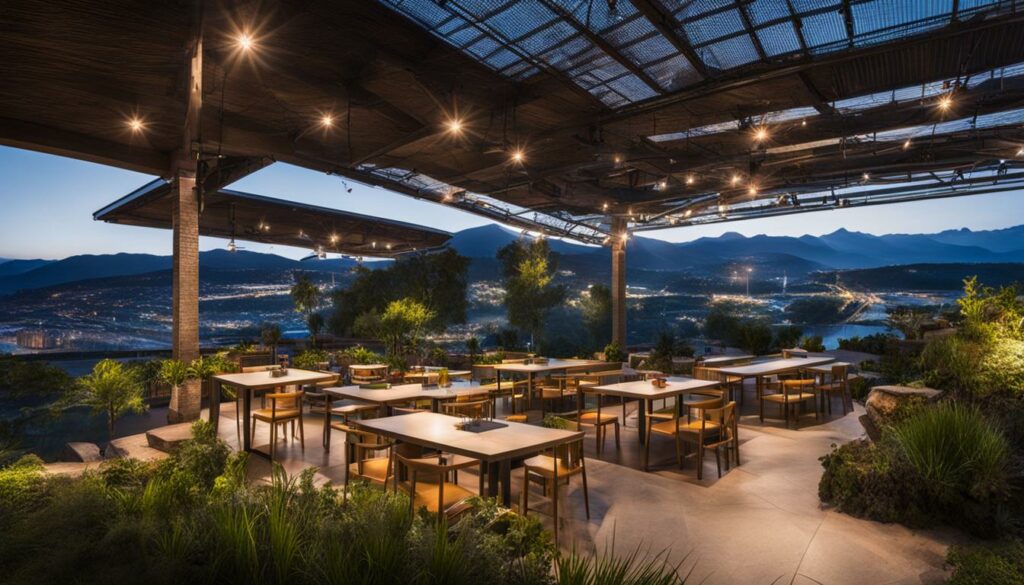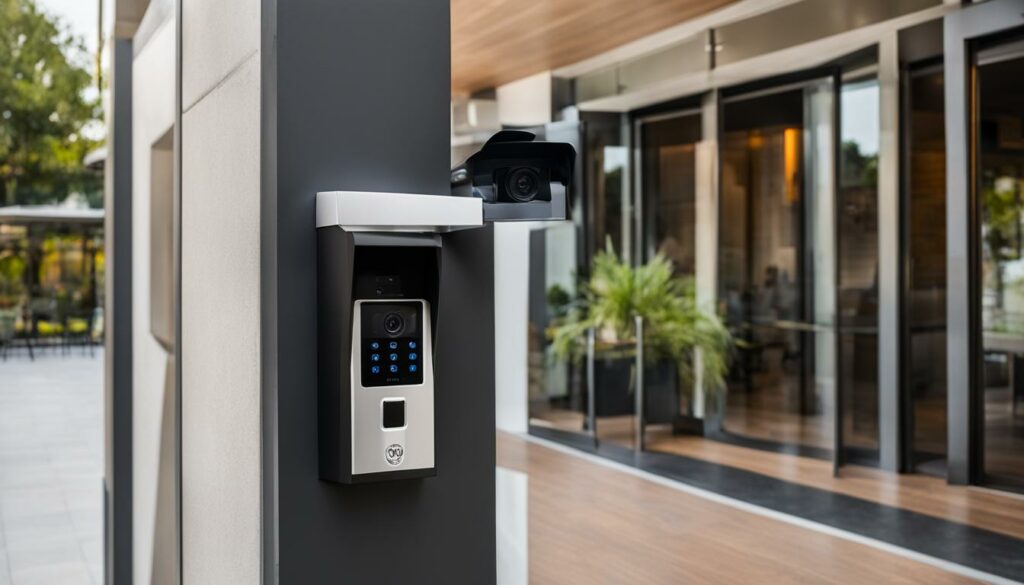In recent years, outdoor hospitality venues have become increasingly popular for hosting events, concerts, and festivals. While these venues provide a unique experience for guests, they also present a range of security concerns. Events hosted in open-air settings are inherently more vulnerable than those held in enclosed spaces, making the need for robust security solutions more pressing than ever.
Fortunately, advances in technology have made it possible for outdoor hospitality venues to enhance their security measures and ensure the safety of their guests. From smart surveillance systems to digital access controls, innovative technology solutions can help prevent potential security threats and minimize risk.
Key Takeaways:
- Outdoor hospitality venues require advanced security solutions to ensure guest safety.
- Technological innovations such as smart surveillance and digital access controls can be utilized in outdoor hospitality security systems.
- Surveillance systems are a critical component of outdoor hospitality security.
- Access control solutions can assist in safeguarding guests and preventing unauthorized entry in outdoor hospitality settings.
- Training and education on security technology are necessary for outdoor hospitality staff members.
The Role of Outdoor Hospitality Security Technology

When it comes to outdoor hospitality security, technology plays a crucial role in safeguarding both guests and properties. The use of advanced security systems and smart technology helps to detect and prevent potential security threats, providing a secure environment for all.
Through the implementation of outdoor hospitality security technology, venue owners can benefit from a range of innovative solutions that ensure guest safety and enhance overall security. These include:
Smart Technology
Smart technology is a valuable tool for outdoor hospitality security. With features like facial recognition software and automatic license plate readers, venues can quickly and accurately screen guests and identify potential threats. Additionally, smart cameras and sensors can detect unusual activity and alert security staff in real-time.
Advanced Security Systems
Advanced security systems, such as access control and visitor management systems, provide comprehensive solutions for outdoor hospitality security. By creating digital records of guest information and monitoring access points, venues can control and limit entry, streamlining check-ins and preventing unauthorized access.
These solutions enable venue owners to provide guests with a secure and enjoyable experience, while maintaining strict security measures. By investing in outdoor hospitality security technology, venue owners can demonstrate their commitment to guest safety and enhance their reputation as a secure event location.
Surveillance Systems for Outdoor Hospitality Security

Surveillance systems play a critical role in ensuring the security of outdoor hospitality venues. These systems use advanced outdoor security technology, such as high-resolution cameras, motion sensors, and remote monitoring software, to detect potential security threats and provide real-time incident responses. Without proper surveillance, outdoor hospitality venues risk becoming easy targets for criminal activity, threatening guest safety and event experiences.
| Benefits of Outdoor Security Systems for Surveillance | Examples of Surveillance Technologies |
|---|---|
| Deterrence: Visual surveillance acts as a deterrent for potential criminals, lowering the risk of property damage or theft. | Camera Systems: Modern, high-definition camera systems with powerful zooming capabilities enable efficient outdoor surveillance. |
| Threat Detection: Outdoor surveillance systems can detect potential threats from afar, allowing for timely response. | Perimeter Sensors: These sensors detect motion and alert security officials when someone enters a restricted area. |
| Real-time Response: Surveillance systems provide real-time monitoring and response capabilities, enabling officials to respond to potential incidents swiftly. | Remote Monitoring: Some surveillance technologies enable remote monitoring and control, allowing for event security officials to view footage from anywhere. |
The use of Outdoor security systems for surveillance also brings about legal and ethical considerations, including privacy concerns. Organizations need to ensure the proper use and storage of collected surveillance data in compliance with State and Federal privacy laws.
Overall, surveillance systems are an essential component of outdoor hospitality security technology. With advanced surveillance systems in place, outdoor venues can effectively monitor activities, deter criminal behavior, and provide real-time incident responses, maintaining the safety and security of guests and staff.
Access Control Solutions for Outdoor Hospitality Security

In outdoor hospitality settings, it’s crucial to have effective access control solutions in place to manage guest access and prevent unauthorized entry. Digital access control systems are a powerful tool for achieving this goal, as they enable granular control over access permissions and streamline check-in processes.
With digital solutions for outdoor hospitality security, guests can be assigned unique access credentials that provide entry only to designated areas of the venue. This can be particularly useful for large events or locations with multiple entry points, ensuring that guests only have access to areas that are relevant to their visit.
One notable example of innovative access control technology is the use of mobile credentials. By sending guest access permissions directly to their smartphones, venues can eliminate the need for physical badges or tickets, making the check-in process faster and more convenient. Plus, mobile credentials are highly secure and difficult to copy, providing an added layer of protection against fraudulent entry.
Key Benefits of Digital Access Control
Digital access control solutions offer several key benefits for enhancing outdoor hospitality security:
- Improved access management: Granular control over access permissions can ensure that only authorized individuals have entry to specific areas of the venue.
- Streamlined check-in processes: Digital access credentials can be sent directly to guests’ smartphones, enabling a faster and more convenient check-in experience.
- Enhanced security: Digital access control systems can provide real-time monitoring and alerts for any unauthorized entry attempts, reducing vulnerabilities and minimizing security risks.
By leveraging the power of digital access control, outdoor hospitality venues can create a secure environment for guests and staff, while simultaneously enhancing the overall event experience.
Communication and Emergency Response Technology
When it comes to outdoor hospitality security, reliable communication and effective emergency response technology are critical components. With large crowds and the potential for incidents, it is crucial to have communication tools that facilitate quick response times during emergencies. Innovative technology solutions can help ensure that staff members are efficiently communicating and responding to incidents, making guests feel safe and secure.
One example of such technology is a panic button system that immediately alerts staff of any emergency situations or security concerns. This type of solution can be particularly effective in large outdoor events where communication can be challenging. As such, it is an essential tool for optimizing security in outdoor events. Similarly, smart speakers and two-way radios are also helpful communication tools for outdoor events, allowing staff members to seamlessly communicate with one another regarding any security issues.
During emergency situations, technology can play an instrumental role in assessing and managing incidents. For instance, facial recognition software can rapidly detect and identify potential suspects in real-time, while drone technology can aid in providing an aerial platform for monitoring and responding to incidents. Additionally, digital emergency response tools, such as mass notification systems, can notify guests and staff members of any potential security concerns, allowing them to take preventative action to keep themselves safe.
Overall, effective communication and emergency response technology are integral to outdoor hospitality security. By leveraging innovative solutions, venues can efficiently detect and respond to any potential threats or emergencies, ensuring a safe and secure environment for all guests and staff members alike.
Data Security and Privacy in Outdoor Hospitality

As the use of outdoor hospitality security technology continues to increase, the protection of guest data becomes paramount. Technology solutions for outdoor hospitality security must include robust data security measures that prevent unauthorized access, protect against cyber threats, and ensure compliance with privacy regulations.
The use of digital systems to manage guest information, such as booking details and payment information, creates a potential vulnerability for data breaches. This makes it essential to invest in technology solutions for outdoor hospitality security that can provide secure data storage and encrypted transmission.
Moreover, outdoor hospitality venues should implement access controls for sensitive data, allowing only authorized personnel to access it. This reduces the risk of internal data breaches and unauthorized access to guest information.
An effective way of ensuring guest data security is to conduct regular security audits of the systems and processes. This helps detect vulnerabilities and weaknesses in the security systems and allows them to be addressed before any incidents occur.
Compliance with Privacy Regulations
Outdoor hospitality venues must also comply with privacy regulations such as the General Data Protection Regulation (GDPR) or the California Consumer Privacy Act (CCPA) to protect guest privacy. These regulations require that guest data is collected lawfully, transparently, and used only for specific purposes.
Venues must provide appropriate information to guests about their data processing activities and allow guests to exercise their rights, such as data access and deletion requests.
Outdoor hospitality security technology solutions should ensure that they comply with these privacy regulations, making them an essential part of a comprehensive technology solution for outdoor hospitality security.
Integration of Technology Solutions for Effective Security
Having diverse security solutions in place to create a comprehensive security system for outdoor hospitality is crucial in ensuring the safety of guests, staff, and properties. It is vital to have a centralized management platform that integrates different security technologies into a cohesive ecosystem. This automated approach delivers enhanced situational awareness by consolidating disparate sensor-generated data into a single view. By so doing, it provides a more comprehensive understanding of events and incidents and enables faster decision-making and response.
Centralized management platforms integrate diverse outdoor security technologies like surveillance systems, access controls, and communication, and incident detection technologies into one effective system. These centralized management platforms help to manage, distribute, control, and monitor applications used in outdoor security technology.
- Coordinating multiple technologies to create synergies that allow for a more robust and effective security system.
- Simplifying management and reducing complexity by establishing a single point of data integration.
- Efficiently managing deployment, configuration, and updates over a centralized management platform.
- Improve security around cost-effectiveness by eliminating data silos and duplication of efforts.
- Increase efficiency in monitoring and response time by aggregating data into a single view
Training and Education on Security Technology
Ensuring that employees are well-equipped to handle outdoor hospitality security technology is vital for creating an effective security system. Whether it’s access control solutions, surveillance systems, or emergency response technology, proper training and education are necessary to maximize the benefits and reduce the risks of using these tools.
Having a solid understanding of how to operate and manage security technology is essential for ensuring that outdoor hospitality venues are safe and secure. This includes not only the front-line staff responsible for implementing the technology but also those who oversee and manage the security system.
Comprehensive training programs can help employees better understand the capabilities of security technology and how to utilize it effectively. Training can cover everything from basic operation and maintenance to recognizing potential security threats, responding to emergencies, and managing incident reports.
Training should be ongoing to ensure that employees are up to date on the latest security technology and how to best utilize it. This also includes providing ongoing education on emerging technologies and potential security threats.
By investing in training and education on security technology, outdoor hospitality venues can maximize the benefits of security solutions while minimizing risks and ensuring guest safety.
Future Trends in Outdoor Hospitality Security Technology
In recent years, rapid advancements in technology have transformed the way outdoor hospitality venues approach security. As the industry continues to evolve, smart technology and other innovative solutions are expected to play a crucial role in ensuring guest safety and improving the overall experience.
Smart Tracking and Monitoring
The use of smart tracking and monitoring technologies is set to become increasingly popular in outdoor hospitality security. These technologies can provide accurate real-time data on guest movement, enabling venue operators to monitor guests while ensuring their privacy. Venue operators can use this data to predict and address potential security risks in advance, enhancing the overall guest experience.
Biometric Access Control and Facial Recognition
Biometric access control and facial recognition technologies are gaining prominence in outdoor hospitality venue security. These solutions can effectively monitor and manage guest access while minimizing the risk of unauthorized entry. Additionally, these technologies offer a higher degree of accuracy and convenience compared to traditional access control systems.
Drone Technology
Outdoor hospitality venues can benefit from drone technology for enhanced security. Drones can be used to assess and monitor large outdoor events and provide real-time data to venue security teams. Additionally, drones can be used to scan and identify potential security threats, reducing response times in the event of an incident.
Cloud-Based Security Systems
Cloud-based security systems are becoming increasingly popular in outdoor hospitality venues. These systems can offer centralized management, making it easier for venue operators to manage and monitor multiple security systems from a single platform. Additionally, cloud-based systems offer enhanced data security and protection against cyber threats.
In conclusion, the future of outdoor hospitality security technology is exciting, with innovative solutions set to transform the industry in the coming years. Enhancing guest safety and experience will continue to be the top priority, and venues that adopt these new technologies will be better positioned to provide a secure and seamless environment for their guests.
Conclusion
As outdoor hospitality venues become more popular, the need for increased security measures is no longer a luxury but a necessity. By leveraging technology solutions like access control systems, surveillance systems, and communication and emergency response technology, outdoor hospitality venues can create a secure environment for guests and staff.
However, technology alone cannot guarantee security. Proper training and education for staff members on security technology are also critical. Regular security audits, software updates, and keeping up with emerging trends in outdoor hospitality security technology are essential for continuous improvement.
As technology continues to evolve, outdoor hospitality venues can also stay ahead of the curve by investing in innovative solutions such as smart technology and artificial intelligence. By implementing a comprehensive security plan and continuing to adapt, outdoor hospitality venues can create a safe and enjoyable environment for guests.
FAQ
What is outdoor hospitality security technology?
Outdoor hospitality security technology refers to the use of advanced technological solutions to enhance security in outdoor hospitality settings. This includes the implementation of innovative tools such as smart technology, surveillance systems, access control solutions, and communication systems for effective security management.
Why is outdoor hospitality security technology important?
Outdoor hospitality security technology is important for ensuring guest safety and creating seamless event experiences. It allows venues to detect and prevent potential security threats, monitor activities, control access, and effectively respond to emergencies or incidents. It also helps protect sensitive guest information, ensure compliance with privacy regulations, and future-proof outdoor hospitality security systems.
What are some examples of outdoor hospitality security technology?
Examples of outdoor hospitality security technology include smart surveillance cameras, access control systems, intrusion detection systems, perimeter fencing with sensor technology, biometric identification systems, emergency communication systems, and centralized management platforms. These technologies work together to provide comprehensive security coverage and enhance overall safety.
How can surveillance systems enhance outdoor hospitality security?
Surveillance systems play a crucial role in outdoor hospitality security by providing real-time monitoring and recording capabilities. They act as a deterrent to criminal behavior, help identify potential security threats, and assist in post-incident investigations. Advanced surveillance systems can also integrate with other security technologies and support analytics for improved situational awareness.
What are access control solutions and how do they enhance outdoor hospitality security?
Access control solutions are technologies that manage and control entry to outdoor hospitality venues. They can include digital key systems, mobile access solutions, visitor management systems, and biometric identification. These solutions enhance outdoor hospitality security by streamlining guest access, preventing unauthorized entry, and providing a seamless and secure check-in process.
How does communication and emergency response technology contribute to outdoor hospitality security?
Communication and emergency response technology play a crucial role in outdoor hospitality security by facilitating effective communication and rapid response during emergencies or incidents. This includes emergency call stations, two-way radios, mass notification systems, and mobile applications. Robust communication systems ensure swift coordination, timely alerts, and efficient management of emergencies, enhancing overall guest safety.
How can outdoor hospitality venues ensure data security and privacy?
To ensure data security and privacy, outdoor hospitality venues can implement robust technology solutions. These include secure network infrastructure, encryption, firewalls, antivirus software, and secure storage systems. Additionally, venues should adhere to best practices in data handling, employ strict access controls, and comply with privacy regulations to protect sensitive guest information from cyber threats and unauthorized access.
Why is the integration of technology solutions important for effective outdoor hospitality security?
The integration of technology solutions is important for creating a comprehensive and effective outdoor hospitality security system. By integrating different security technologies, such as surveillance systems, access control solutions, and communication systems, venues can achieve better situational awareness, streamline operations, and improve incident response. Centralized management platforms allow for centralized control and monitoring of multiple technologies, enhancing overall security management.
How can staff training and education on security technology improve outdoor hospitality security?
Training and education on security technology is essential for outdoor hospitality staff to effectively operate and leverage security solutions. Staff should receive comprehensive training on the use of surveillance systems, access control solutions, and communication technology. This ensures that they are proficient in handling and responding to security incidents, enhancing overall security measures and guest safety.
What are some future trends in outdoor hospitality security technology?
Future trends in outdoor hospitality security technology include the increased use of smart technology, artificial intelligence, and automation. This may include the integration of smart sensors, facial recognition technology, predictive analytics, and cloud-based security solutions. These innovations have the potential to further enhance security measures, improve operational efficiency, and create more personalized guest experiences.





